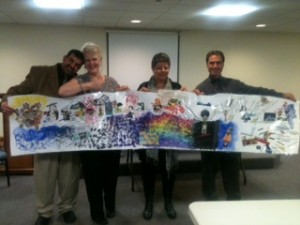The topic of suicide prevention is not what one would consider as befitting a column on bliss, but Phil Garber, Janet Berkowitz and Gary Schoenberg have seen the potentially life saving outcome of their work. That to them, is bliss. I have known Janet since the early 1980’s, Phil since the latter part of that decade and Gary since 1998. Each has an investment, either personally or professionally in this topic.
Gary is a licensed Psychologist who works as Continuing Care Director at COMHAR which is a community based mental health organization in Philadelphia. Janet and Phil have been recipients of both inpatient and outpatient mental health services at various points in their lives. Together this husband and wife team facilitate presentations for consumers and mental health professionals via Creative Communication Builders. The subject matter ranges from bullying prevention and Obsessive Compulsive Disorder to addiction recovery and Bi-Polar Disorder. Their class entitled Creative Crisis Care: Taking Suicide Out of the Closet was offered to a group of Social Workers as a means of earning continuing ed credits, which are required to maintain our professional licenses. In the three hours we shared together, I found myself laughing, crying, and smiling in recognition of the universality of emotion whether or not we have mental health challenges. The tears also flowed as Phil and Janet shared their personal stories of how depression and turning to the unthinkable option of suicide, became their daily or near daily companions.
For Janet, suicidal ideation (although she acknowledges never having acted on the thoughts that hammered at her) came as part and parcel of early bullying experiences by peers. At age 8, she had her first thought that ending her life would be a way out of her torment. In the interceding years, this woman, now in the 5th decade of her life, had multiple hospital admissions, has taken nearly every mood stabilizing medication on the market and has been in outpatient treatment to deal with the devastating impact of this illness. Janet is also 24 years clean and sober, a milestone she proudly announced in the class. Lately, she has come to identify herself as thriver who has moved past seeing herself as a mental health consumer and now reaches out to help others. Both Janet and Phil are in training to become peer support specialists. Phil took a different route and his encounter with the system came as a result of cardiac surgery, complications with anesthesia and a sense of failure when he was not able to work for a time. He did attempt to take his own life and blessedly lived to tell about it.
The workshop offered both didactic and experiential exercises that highlighted brilliantly, the impact of suicide on the community, the startling statistics and the need to learn how to support those who are living in the darkness of the thoughts that could and do lead to the premature end of life for those we love. I found one exercise to be particularly powerful for me as a mental health professional since 1979. A writing assignment, it provided aha-insight into the mind of someone for whom suicide does happen to feel like an option.
As a result of their experiences, Phil and Janet have organized Suicide Anonymous Groups and urge others to do so as well. In comparison to its predecessors of AA and NA, this self help group is startlingly limited in the number of meetings that currently exist.
Art is a huge part of the work that Janet does, being trained in a modality called WRAP Wellness Recovery Action Plan that was created by Mary Ellen Copeland who is the author of The Depression Workbook. She incorporates what she calls WRAP Scrap and created a scrap book that is a work in progress display of the various aspects of her life. Janet also designed a time line of the depression/suicide roller coaster ride she has been on and it is displayed in the image above.
What it all seemed to come down to is that any of us could become vulnerable and deserve respectful and compassionate intervention, as free as possible of damaging stigma.
www.creativecommunicationbuilders.com
www.suicideanonymous.com
www.mentalhealthrecovery.com
http://youtu.be/UyXoRxsG92M Recovery In Mental Health by Annette Palmer


